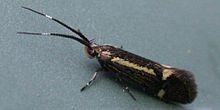Esperia sulphurella
| Esperia sulphurella | |
|---|---|

| |
| Scientific classification | |
| Domain: | Eukaryota |
| Kingdom: | Animalia |
| Phylum: | Arthropoda |
| Class: | Insecta |
| Order: | Lepidoptera |
| Family: | Oecophoridae |
| Genus: | Esperia |
| Species: | E. sulphurella
|
| Binomial name | |
| Esperia sulphurella (Fabricius, 1775)
| |
| Synonyms | |
|
Esperia aucta (Krausse, 1915) | |
Esperia sulphurella, also known as the sulphur tubic, is a species of gelechioid moth in the family Oecophoridae. It is native to Europe, but has been introduced in California.[1]

Adults have a body length of 6–8 millimetres (0.24–0.31 in), and its wingspan is 12–16 millimetres (0.47–0.63 in). The wingspan is between 12 and 16 millimeters. They have a dark brown ground colour. The forewing has a pale yellow marking. The predominantly pale yellow hind wings are dark brown at the tips. At about two-thirds of the length of the antennae, the antennae have a white band.
They are on wing in spring.[1]
The larvae are black and feed on dead wood.[1]
Taxonomy
[edit]E. sulphurella was first described scientifically by J.C. Fabricius in 1775. Subsequently, the same scientific name was used for several other moths, creating a number of junior homonyms that are all invalid. These include:
- T. sulphurella of Fabricius (1777) is Oecophora bractella
- T. sulphurella of Hübner (1793) is Ypsolophus sulphurella
- T. sulphurella of Haworth (1829) is Povolnya leucapennella
References
[edit]- ^ a b c Will, Kip; Gross, Joyce; Rubinoff, Daniel; Powell, Jerry A. (2020). Field Guide to California Insects. Oakland, California: University of California Press. pp. 353–354. ISBN 9780520288744.
External links
[edit]
